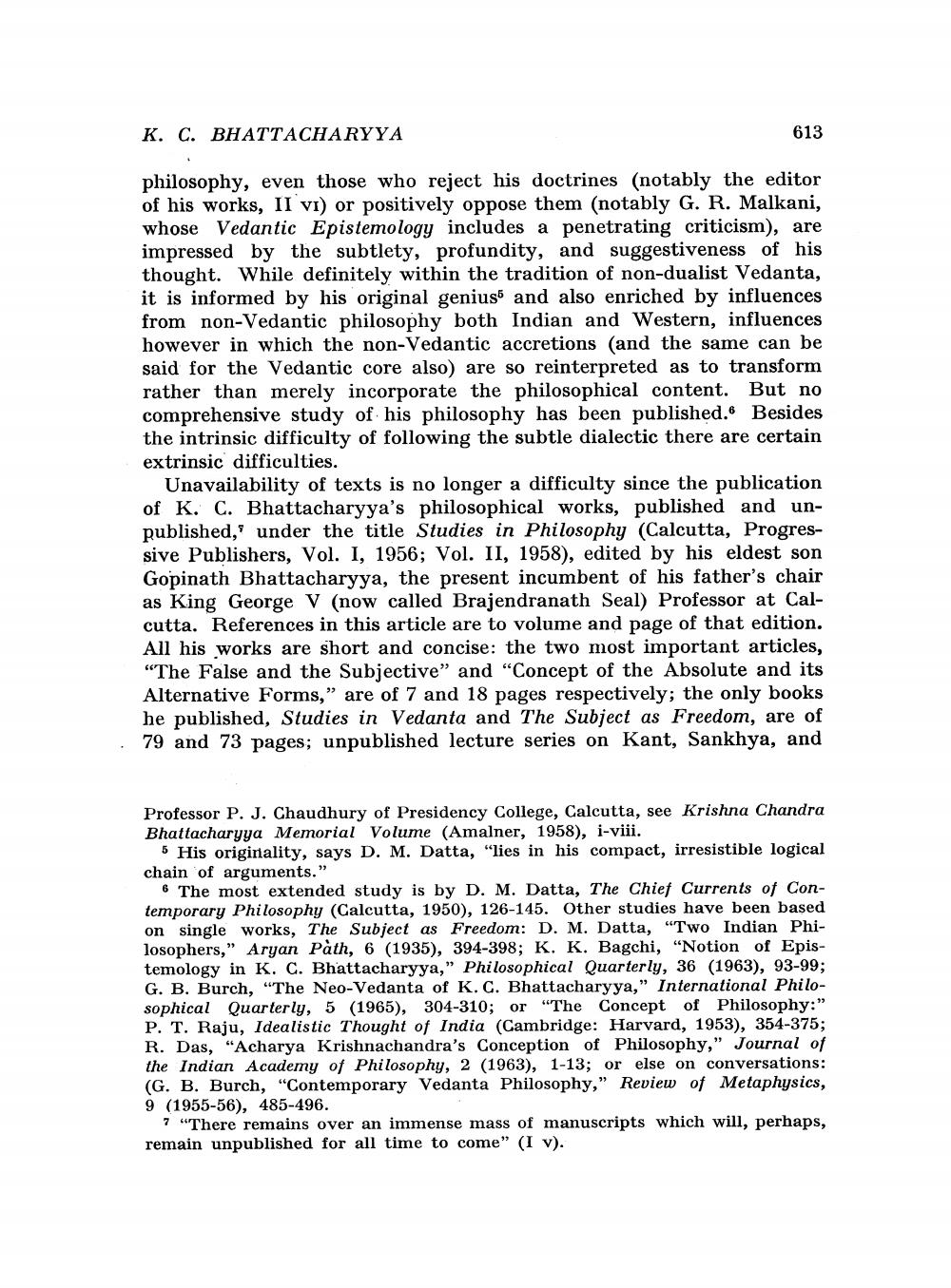Book Title: Search For Absolute In Neo Vedanta Author(s): George B Burch Publisher: George B Burch View full book textPage 3
________________ K. C. BHATTACHARYYA 613 philosophy, even those who reject his doctrines (notably the editor of his works, II vi) or positively oppose them (notably G. R. Malkani, whose Vedantic Epistemology includes a penetrating criticism), are impressed by the subtlety, profundity, and suggestiveness of his thought. While definitely within the tradition of non-dualist Vedanta, it is informed by his original genius and also enriched by influences from non-Vedantic philosophy both Indian and Western, influences however in which the non-Vedantic accretions (and the same can be said for the Vedantic core also) are so reinterpreted as to transform rather than merely incorporate the philosophical content. But no comprehensive study of his philosophy has been published. Besides the intrinsic difficulty of following the subtle dialectic there are certain extrinsic difficulties. Unavailability of texts is no longer a difficulty since the publication of K. C. Bhattacharyya's philosophical works, published and unpublished, under the title Studies in Philosophy (Calcutta, Progressive Publishers, Vol. I, 1956; Vol. II, 1958), edited by his eldest son Gopinath Bhattacharyya, the present incumbent of his father's chair as King George V (now called Brajendranath Seal) Professor at Calcutta. References in this article are to volume and page of that edition. All his works are short and concise: the two most important articles, "The False and the Subjective” and “Concept of the Absolute and its Alternative Forms,” are of 7 and 18 pages respectively; the only books he published, Studies in Vedanta and The Subject as Freedom, are of 79 and 73 pages; unpublished lecture series on Kant, Sankhya, and Professor P. J. Chaudhury of Presidency College, Calcutta, see Krishna Chandra Bhattacharyya Memorial Volume (Amalner, 1958), i-viii. 5 His originality, says D. M. Datta, "lies in his compact, irresistible logical chain of arguments.” 6 The most extended study is by D. M. Datta, The Chief Currents of Contemporary Philosophy (Calcutta, 1950), 126-145. Other studies have been based on single works, The Subject as Freedom: D. M. Datta, "Two Indian Philosophers,” Aryan Path, 6 (1935), 394-398; K. K. Bagchi, "Notion of Epistemology in K. C. Bhattacharyya," Philosophical Quarterly, 36 (1963), 93-99; G. B. Burch, "The Neo-Vedanta of K.C. Bhattacharyya," International Philosophical Quarterly, 5 (1965), 304-310; or "The Concept of Philosophy:” P. T. Raju, Idealistic Thought of India (Cambridge: Harvard, 1953), 354-375; R. Das, "Acharya Krishnachandra's Conception of Philosophy," Journal of the Indian Academy of Philosophy, 2 (1963), 1-13; or else on conversations: (G. B. Burch, "Contemporary Vedanta Philosophy," Review of Metaphysics, 9 (1955-56), 485-496. 7 "There remains over an immense mass of manuscripts which will, perhaps, remain unpublished for all time to come" (Iv).Page Navigation
1 2 3 4 5 6 7 8 9 10 11 12 13 14 15 16 17 18 19 20 21 22 23 24 25 26 27 28 29 30 31 32 ... 57
